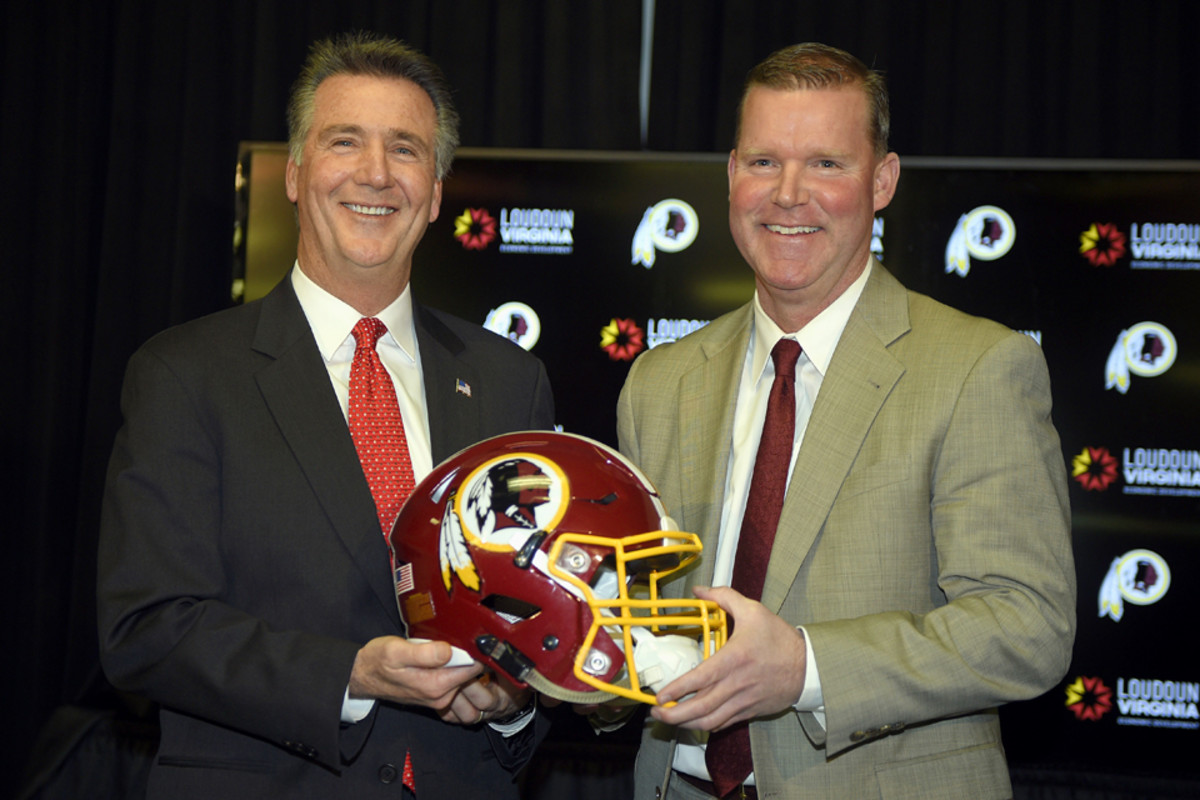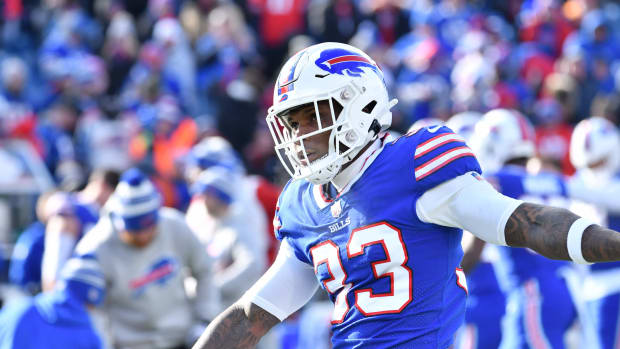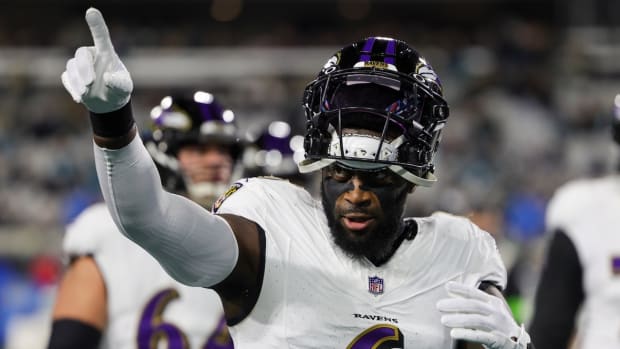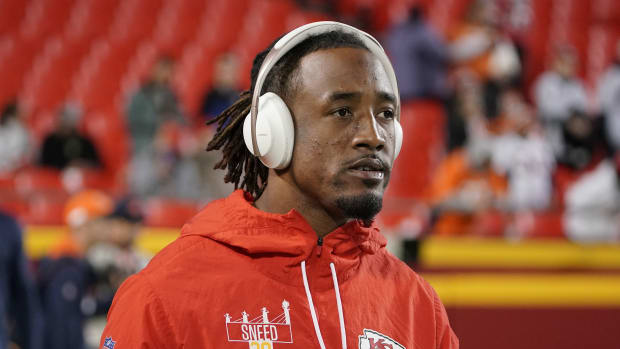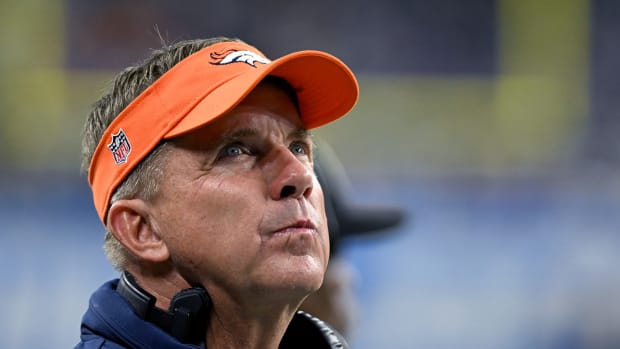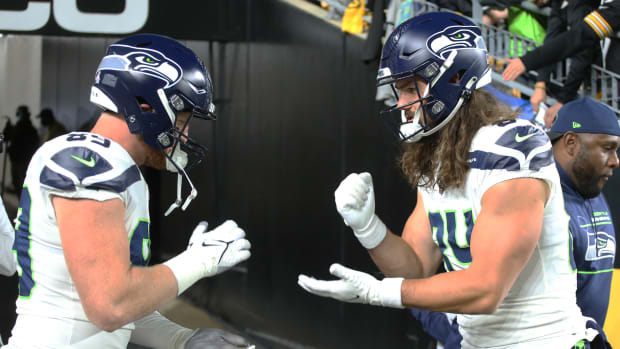The Man Who Can Finally Change Washington
By hiring Scot McCloughan to be their general manager, the Redskins, at long last, may be transforming themselves into a team that builds for sustained success rather than always searching for a quick fix. McCloughan (pictured above, right) is a seasoned scout who has been given autonomy and authority to implement his skill set, and he’s always been energized by the search to find players. The future of player acquisition and retention bodes well for a team that has been challenged in that area.
I worked with McCloughan for a few years in Green Bay, and after he left I would see him regularly at league events. Scot is immediately likable; he’s always ready with a “Hey bud!” and an ever-present chaw of tobacco in his cheek. Whether in draft meetings or in chatter among the group, he was in his element talking about players (in sometimes NSFW language) and did so with conviction, even if he went against the consensus.
Scot now becomes the fifth current general manager from the scouting tree of former Packers general manager Ron Wolf, joining Ted Thompson (Packers), John Schneider (Seahawks), John Dorsey (Chiefs) and Reggie McKenzie (Raiders)—and, at some point soon Wolf's son, Eliot, who is the director of player personnel for the Packers. will be another. The elder Wolf, who hired me on the business side in Green Bay, was very direct in interviewing scouting candidates. After a few pleasantries, he would simply send the candidate to a dark room with a clicker and a sheet of paper to “write up” a player. Scouts were hired, or passed over, based on that scouting report. As Ron would sometimes note about a prospect, “He can’t play,” the GM would look at a potential scout’s report and say, “He can’t scout.” There was great clarity in his minimalist approach.
While some members of Wolf’s scouting tree are more aggressive in free agency than others, all were schooled in the philosophy of 1) building an infrastructure of young, reasonably priced players through the draft; 2) trusting coaches to play and develop young players; and 3) securing contract extensions with ascending core players before they reach their leverage point of free agency. The Redskins have now acquired the institutional knowledge not only of McCloughan, but also of Wolf, Thompson, Dorsey, Schneider and McKenzie—to say nothing of McCloughan’s subsequent experiences with the 49ers and Seahawks. For a team that has lost often in recent years, this is a nice win for Washington.
People in the league were aware of McCloughan’s issues with alcohol for some time, and he publicly addressed them in an ESPN The Magazine story in early December. The topic required vulnerability in the team’s interview process. There had to be open and honest communication, but Scot also had options, and he wasn’t going to rush to sign up for the wrong job. He needed assurances from Daniel Snyder and Bruce Allen that there wouldn’t be interference from the top and that everyone would be patient with his plan.
With that autonomy, McCloughan will install a more proven model of success, bringing stability to a franchise that has made too many impulsive decisions driven by emotion. He will develop a pipeline of young talent on a roster that has had too many holes in recent times. Scot will find players. He always has.
Now, I’ll answer some questions that I routinely get asked around this time of year…
Can you explain these reserve/future contracts we see players signing now?
The moment the 2014 regular season ends, teams—including those in the playoffs and those going through coaching/management changes—are signing players to round out their 2015 rosters. Many of these signings are players from the practice squad, and most receive little to no signing bonus. If the player makes the team, it’s usually with a minimum salary.
Postseason Coverage
The sun hasn’t set on Peyton ManningBreaking down the conference title gamesA hobbled Aaron Rodgers adds to Packers’ loreSpending a football Sunday with Richard Sherman
The reason players are signed in a reserve/future category is that we are in an administrative no-man’s land on the calendar. The 2014 salary cap has been frozen, and the 2015 league year doesn’t start until March 10. The reserve category keeps these contracts in this suspended state until that time.
As with undrafted free agents, scouting staffs can separate themselves in uncovering talent in this category. I remember signing Cullen Jenkins as a reserve/future player, and he turned out to be a very productive player for the Packers, Eagles and Giants.
How are players paid during the playoffs?
Individual player contracts are irrelevant in the playoffs; everyone is paid the same according to a CBA-negotiated schedule for each round. For example, Peyton Manning earned roughly $882,000 per game during the season, yet made just $24,000 for the Broncos’ lone playoff game—an $858,000 pay cut.
Here is the breakdown of this year’s postseason payouts, per round:
Wild Card
Division champs (Panthers, Cowboys, Steelers, Colts): $24,000
Wild cards (Cardinals, Lions, Ravens, Bengals): $22,000
Divisional Playoff Game
$24,000
Conference Championship
$44,000
Winning team: $97,000
Losing team: $49,000
Players on the practice squad continue to receive their weekly amount—usually the $6,300 minimum—during the playoffs.
Thus, the maximum a player could receive for winning the Super Bowl this year would be $189,000 (or $165,000 for players on teams that had a bye). When a player says, “It's not about the money,” my usual Brandtslation is, “It's all about the money,” but for these few weeks the cliché may actually ring true (not that they have a choice).
Referee Redux
Finally, my take on the major story coming out of divisional weekend: I have heard all the explanations and still don’t understand how Dez Bryant’s catch was ruled an incomplete pass. Examining this rule will likely become a top agenda item for the NFL’s competition committee (of which the Cowboys’ Stephen Jones is a member). However, that committee has had ample opportunity to address the rule since the 2010 Calvin Johnson play. Now we will see if there is traction, although the emotion of January will have faded by the time the committee assembles in March.
In the bigger picture, the officials have once again become part of the conversation. In covering the 2012 NFL referee lockout, I remember the NFL’s top priority was to make officials more accountable and less a part of the story. Moreover, the referees negotiated to have “All-Star crews” in the playoffs rather than keeping existing crews intact. These All-Star crews were meant to reward the best officials, but they’re getting a lot of attention for the wrong reasons.
With officiating being a part of the story, it’s worth emphasizing that the NFC Championship Game features the Packers and Seahawks in Seattle, the same teams playing at the same place where the “Touchception” served as the death knell for replacement referees. Unfortunately, the real referees’ performance continues to be a story two years later. Hopefully we won’t be talking about them on Monday.
Follow The MMQB on Facebook, Twitter and Instagram.
[widget widget_name="SI Newsletter Widget”]
































